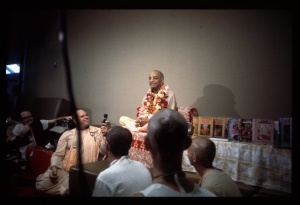CC Madhya 5.158 (1975)

A.C. Bhaktivedanta Swami Prabhupada
TEXT 158
- daṇḍa-bhaṅga-līlā ei--parama gambhīra
- sei bujhe, duṅhāra pade yāṅra bhakti dhīra
SYNONYMS
daṇḍa-bhaṅga-līlā—the pastime of breaking the staff; ei—this; parama—very; gambhīra—grave; sei bujhe—one can understand; duṅhāra—of both of Them; pade—to the lotus feet; yāṅra—whose; bhakti—devotional service; dhīra—fixed.
TRANSLATION
The pastime of the breaking of the staff is very deep. Only one whose devotion is fixed upon the lotus feet of the two Lords can understand it.
PURPORT
One who understands Śrī Caitanya Mahāprabhu and Nityānanda Prabhu in reality can understand Their identity as well as the breaking of the staff. All the previous ācāryas, being induced to engage themselves fully in the service of the Lord, gave up attachment for material life and thus accepted the staff, which signifies full engagement of the mind, speech and body in the service of the Lord. Śrī Caitanya Mahāprabhu accepted the regulative principles of the renounced order of life. That is completely clear. However, in the paramahaṁsa stage there is no need to accept a daṇḍa (staff), and Śrī Caitanya Mahāprabhu was certainly in the paramahaṁsa stage. Nonetheless, to indicate that everyone should take sannyāsa at the end of life in order to engage fully in the service of the Lord, even paramahaṁsas like Śrī Caitanya Mahāprabhu and His confidential devotees follow the regulative principles unfailingly. Indeed, that was His purpose. Nityānanda Prabhu, who was His eternal servitor, believed that there was no need for Śrī Caitanya Mahāprabhu to carry the staff, and to declare to the world that Śrī Caitanya Mahāprabhu was above all regulations, He broke it into three pieces. The pastime known as daṇḍa-bhaṅga-līlā is thus explained by Śrīla Bhaktisiddhānta Sarasvatī Ṭhākura.